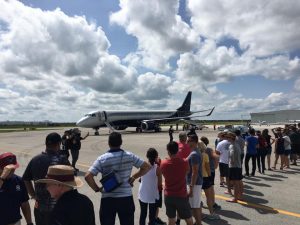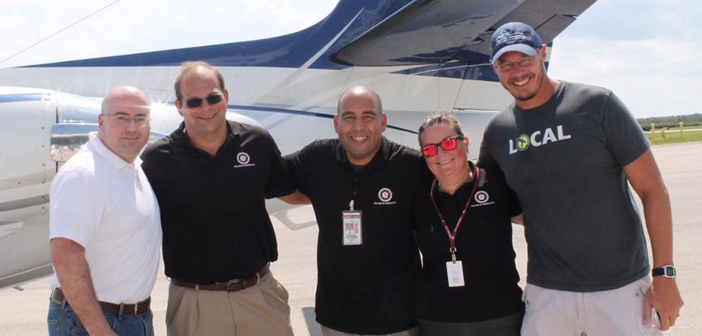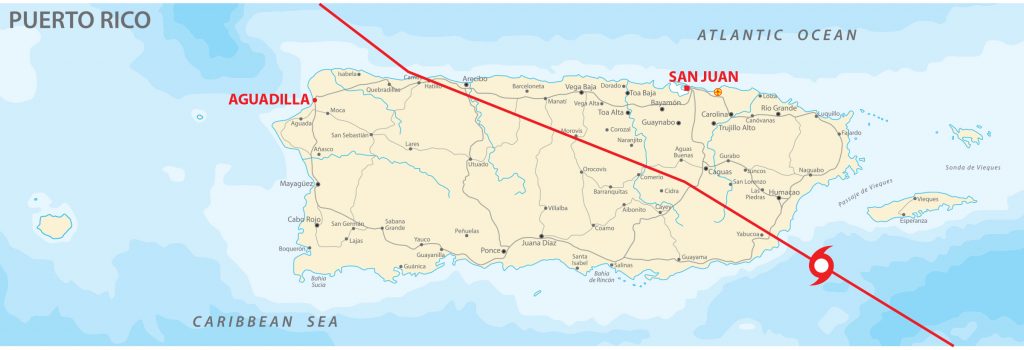Aero Altruism: Alumni Collaborate for Puerto Rico Relief Efforts
In late September, Hurricane Maria hammered Puerto Rico at nearly Category 5 strength. With maximum sustained winds of 155 mph, it was the most powerful storm to strike the island since 1932. For more than 30 hours, the gales lashed the island—snapping trees, toppling buildings and destroying already battered and delicate infrastructure. It plowed ashore near the southeastern town of Yabucoa and traversed to the northwest, sparing nothing in its path.
In the face of such large-scale destruction, traditional logistics—interior roadways, the island’s two international airports and communication channels in general—were in chaos. Miguel Estremera ’98, a native of Puerto Rico with many family members on the island, learned from Jeff Ciarcia ’11 that air traffic controllers in San Juan, among them former classmate Tony Baez, were living at the ATC facility because their homes were destroyed. Their generator had exploded, crippling an already precarious operation to safely navigate relief efforts into the area. And food and water were dwindling.
Determined to help bridge the gap and get resources and medical supplies to those in need, Estremera, a Boston-based United Airlines pilot, sparked a humanitarian effort that inspired not just the Florida Tech community but the larger Melbourne area as a whole.
The effort began by mobilizing his College of Aeronautics (COA) family.
Finding an Aircraft
One of Estremera’s first calls was to friend and fellow alumna Jo Damato ’97, who put him in touch with the PALS Sky Hope Disaster Relief Program.
Damato was a founding member of Sky Hope, which formed in 2010 to help connect business aviation with humanitarian relief efforts. The organization had recently merged with PALS, or Patient AirLift Services, to form a more comprehensive network dedicated to providing support during emergencies and urgent situations.
“PALS Sky Hope had some assets they were trying to get to Puerto Rico, but they were in need of supplies to put on the airplane,” said Damato. “Miguel had a lot of supplies that needed transport, plus first-hand knowledge of the needs through his family and other personal contacts.”
Through her position with the National Business Aviation Association, Damato has many contacts in the industry.
“A lot of what I try to do is be a matchmaker,” said Damato. “In business aviation frequently, we have airplanes operating empty on one of their legs. Any time we can take advantage of an airplane that might have unused capacity and the owner/operator is willing, especially for charitable purposes, it’s really great to help people—who couldn’t find each other otherwise—be able to start collaborating and do amazing things, like what Miguel did.”
Coordinating the Cargo

With a Citation jet and pilot secured, through the partnership of PALS Sky Hope, Estremera got on the phone with more COA friends. Mike Antalffy ’01, who lives in Houston, agreed to donate $30,000 toward the purchase of generators and supplies for the mission, but the team needed ground support.
Enter Fin Bonset ’96, ’99 M.S.A., College of Aeronautics Alumni Association (COAAA) president.
At daybreak on Sept. 27, while at the beach for an early morning surf, Bonset answered the call.
“Miguel said he had a flight coming in to Melbourne at 12:30 p.m., but we needed to get supplies to load up the plane,” said Bonset. “‘Can you rally the COAAA troops and see who can help?’”
So Bonset alerted the COAAA network, through a combination of social media and a good old-fashioned phone tree, who responded in force.
“We all went and plundered Walmart at 9 a.m.,” said Bonset. “We had 10 carts full of supplies, from diapers to water to generators.”
The excitement was tangible; the benevolence contagious. Staff at Walmart donated a gift card toward the purchases, while other shoppers spontaneously pitched in too.
After a second stop at Causeway Mowers for more generators, the caravan arrived at Orlando Melbourne International Airport (MLB) with nearly 4,000 pounds of supplies. Loaded down and fueled up—with jet fuel donated by the Florida Tech College of Aeronautics—Estremera and pilot/aircraft owner Paul Weissman set course for San Juan.
With additional COAAA support—thanks to connections made by Milton Alvira ’16 and Michael Santana ’16, ’17 M.S.A.—they received the necessary ground clearance, a challenge for a civil flight in a disaster area, and arrived in San Juan by 3:30 p.m.
“This flight was crucial in the beginning of the overall Puerto Rico relief effort,” said Bonset. “By getting needed supplies to air traffic controllers in San Juan, they were able to maintain open airwaves for safely handling aircraft in and out of San Juan’s airspace.”
The support could not have come a moment too soon.
Estremera was shocked at the situation he encountered when he arrived.
“Buildings knocked down, hangars knocked down, the FBO itself looked like what I would describe as the fall of Saigon,” he said. “There were probably 250 people in a building designed to hold maybe 30 to 40. People just trying to get out. Families, children, the elderly—the line wrapped around the building.”
Expanding the Mission

As word spread about the success of the first mission out of Melbourne, Estremera received a call a few days later from representatives for actor/comedian Tyler Perry, who wanted to donate his private jet toward the cause.
In the meantime, Carlos Cerezo ’96, a JetBlue pilot who had weathered the storm at his home in Aguadilla in western Puerto Rico, had safety evacuated to Palm Bay the following week and had donated generously to the first mission, was eager to funnel additional relief to Aguadilla.
“I knew the local hospital was in dire need of supplies,” said Cerezo. “They were pretty much in shut-down mode.”
A friend, the president of the hospital’s board of directors, was able to put Cerezo in touch with the facility’s medical director who provided a list of needs.
The effort required a lot of phone calls and a little luck.
“Honestly, it was an ordeal to try to get ahold of them,” explained Cerezo. “Cell phones weren’t working. There was only one functioning landline at the hospital, in the ER. It was really a challenge. If they were close to the wifi antenna, I could reach them then.”
With his local connections, Cerezo assumed the role of Aguadilla ground coordinator, while Estremera managed the flight logistics and Bonset arranged another supply run in Melbourne.
Tyler Perry’s jet, an Embraer 190, 90-passenger converted private jet—a much larger aircraft than the Citation used on the first mission—was scheduled to arrive at MLB on Sept. 29. Bonset alerted Greg Donovan ’91, MLB executive director, who pledged the full support of his staff and facilities.
“Our airport has extensive capabilities, including the runway length and specialized equipment to facilitate the largest cargo aircraft flying today, so MLB is fully dedicated toward helping the ongoing disaster relief efforts from the air for the people of Puerto Rico,” said Donovan. “Teaming up with FIT students, alumni and staff to make things happen and provide logistical support shows how we can quickly come together to provide for others.”
By that afternoon, nearly 100 volunteers were stationed at the Atlantic Jet Center—including president T. Dwayne McCay, COA student groups, faculty, staff and alumni—to help load nearly 7,000 pounds of relief supplies bound for Aguadilla and San Juan. The flight also transported a team of doctors to the area, while helping other ill and elderly Puerto Ricans return to the continental United States for medical care.
Overall, Bonset explained, it was a collection of great people who came together to make a real difference. Something Dean Korhan Oyman says is unique to the College of Aeronautics.
An Extended Family
“Activities like this only happen in the College of Aeronautics,” Oyman says. “We are the only college on campus to have our own alumni association. Our alumni are very active.”
Assistant Dean Victoria Dunbar concurs. “It sounds cheesy, but we are like a family,” she says. “It’s a culture, and our students see it. They see the faculty working together. They see the connection. When they graduate, they want to participate.”
And participate they do. Each member of the mission agrees.
“The really neat thing about the College of Aeronautics is it celebrates the multigenerational nature of our alumni legacy,” says Damato. “There’s nobody I’ve encountered—from back in the late ’70s graduates to now—who doesn’t feel like they’re a part of that thread.”
“Aviation professionals, who are also FIT alumni, are in key positions at major airlines, airports and other responsible roles necessary for completing missions such as this,” says Donavan. “We all have a common thread—a quality education that taught us at the beginning of our careers to lead when called upon—and now we are putting it into action.”
The outcome has been as heartwarming for the volunteers as it was for the beneficiaries.
“I’m very proud to be a part of the alumni association, and I’m very thankful for these relief flights that helped my island,” says Cerezo, who returned to his home in Aguadilla two months after evacuating. He says things are getting better, slowly but surely. At the time of this writing, the local hospital was still operating at half-capacity due to the extensive storm damage, and Cerezo’s home was still without power.
“It was an honor and a privilege to help,” says Bonset. “The experience was incredible, and I just can’t thank people enough.”
Ever-Ready to Aid
Since these initial missions, Estremera has coordinated several others, primarily out of West Palm Beach or the New England area. He has volunteered as PALS Sky Hope’s mission coordinator on a total of seven flights to aid Puerto Rico. As the pace of recovery has improved, ongoing missions have focused primarily on medical evacuation for critically ill Puerto Ricans.
While Estremera has no longer needed direct involvement from his COA family, he knows they are just a phone call away.
“If I called them up and said, ‘hey, a day from now, I’m running a mission out of Melbourne’ or ‘I need you to do x, y and z,’ they would do it without thinking twice,” he says. “I think that’s the important piece to the Florida Tech saga. The network is ongoing. Whatever it may be—from a hurricane relief effort to something much smaller—that aero network comes together to make it happen.”






